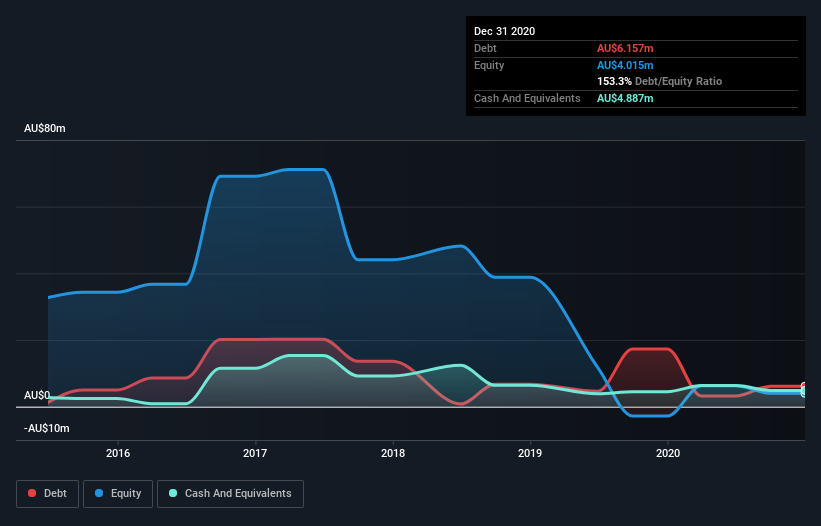IncentiaPay (ASX:INP) Is Making Moderate Use Of Debt
Warren Buffett famously said, 'Volatility is far from synonymous with risk.' So it seems the smart money knows that debt - which is usually involved in bankruptcies - is a very important factor, when you assess how risky a company is. We note that IncentiaPay Limited (ASX:INP) does have debt on its balance sheet. But should shareholders be worried about its use of debt?
What Risk Does Debt Bring?
Debt and other liabilities become risky for a business when it cannot easily fulfill those obligations, either with free cash flow or by raising capital at an attractive price. Ultimately, if the company can't fulfill its legal obligations to repay debt, shareholders could walk away with nothing. However, a more frequent (but still costly) occurrence is where a company must issue shares at bargain-basement prices, permanently diluting shareholders, just to shore up its balance sheet. By replacing dilution, though, debt can be an extremely good tool for businesses that need capital to invest in growth at high rates of return. The first thing to do when considering how much debt a business uses is to look at its cash and debt together.
Check out our latest analysis for IncentiaPay
What Is IncentiaPay's Net Debt?
As you can see below, IncentiaPay had AU$6.16m of debt at December 2020, down from AU$17.3m a year prior. On the flip side, it has AU$4.89m in cash leading to net debt of about AU$1.27m.

A Look At IncentiaPay's Liabilities
Zooming in on the latest balance sheet data, we can see that IncentiaPay had liabilities of AU$17.9m due within 12 months and liabilities of AU$2.51m due beyond that. On the other hand, it had cash of AU$4.89m and AU$695.0k worth of receivables due within a year. So its liabilities outweigh the sum of its cash and (near-term) receivables by AU$14.8m.
This deficit is considerable relative to its market capitalization of AU$21.7m, so it does suggest shareholders should keep an eye on IncentiaPay's use of debt. Should its lenders demand that it shore up the balance sheet, shareholders would likely face severe dilution. There's no doubt that we learn most about debt from the balance sheet. But you can't view debt in total isolation; since IncentiaPay will need earnings to service that debt. So when considering debt, it's definitely worth looking at the earnings trend. Click here for an interactive snapshot.
In the last year IncentiaPay had a loss before interest and tax, and actually shrunk its revenue by 30%, to AU$30m. That makes us nervous, to say the least.
Caveat Emptor
Not only did IncentiaPay's revenue slip over the last twelve months, but it also produced negative earnings before interest and tax (EBIT). Its EBIT loss was a whopping AU$7.6m. Considering that alongside the liabilities mentioned above does not give us much confidence that company should be using so much debt. So we think its balance sheet is a little strained, though not beyond repair. However, it doesn't help that it burned through AU$6.9m of cash over the last year. So suffice it to say we consider the stock very risky. There's no doubt that we learn most about debt from the balance sheet. But ultimately, every company can contain risks that exist outside of the balance sheet. We've identified 6 warning signs with IncentiaPay (at least 2 which can't be ignored) , and understanding them should be part of your investment process.
At the end of the day, it's often better to focus on companies that are free from net debt. You can access our special list of such companies (all with a track record of profit growth). It's free.
If you’re looking to trade IncentiaPay, open an account with the lowest-cost* platform trusted by professionals, Interactive Brokers. Their clients from over 200 countries and territories trade stocks, options, futures, forex, bonds and funds worldwide from a single integrated account. Promoted
Valuation is complex, but we're here to simplify it.
Discover if Entertainment Rewards might be undervalued or overvalued with our detailed analysis, featuring fair value estimates, potential risks, dividends, insider trades, and its financial condition.
Access Free AnalysisThis article by Simply Wall St is general in nature. It does not constitute a recommendation to buy or sell any stock, and does not take account of your objectives, or your financial situation. We aim to bring you long-term focused analysis driven by fundamental data. Note that our analysis may not factor in the latest price-sensitive company announcements or qualitative material. Simply Wall St has no position in any stocks mentioned.
*Interactive Brokers Rated Lowest Cost Broker by StockBrokers.com Annual Online Review 2020
Have feedback on this article? Concerned about the content? Get in touch with us directly. Alternatively, email editorial-team (at) simplywallst.com.
About ASX:EAT
Entertainment Rewards
Engages in the operation of an entertainment, lifestyles, and rewards platform in Australia and New Zealand.
Slight risk and slightly overvalued.
Market Insights
Community Narratives



